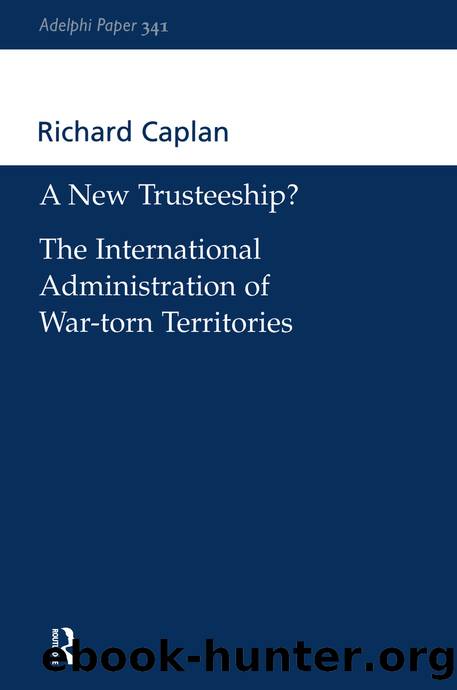A New Trusteeship?: The International Administration of War-Torn Territories by Richard Caplan

Author:Richard Caplan [Caplan, Richard]
Language: eng
Format: epub
Tags: International Relations, Arms Control, Political Science, Political Freedom, General
ISBN: 9781136048647
Google: FROgBAAAQBAJ
Goodreads: 23318401
Publisher: Routledge
Published: 2001-08-31T00:00:00+00:00
Accountability
International administrations, like protectorates and trusteeships before them, derive their legitimacy in part from the notion of trust.33 The idea of international rule over a foreign territory can be legitimate only if that rule is exercised on behalf of, and for the benefit of, the foreign population. To establish international administration on any other basis primarily would constitute exploitation. (One cannot ignore that some benefits â prestige, influence, etc. â may also accrue to the trustee.) Trust, in turn, is assured through the principle of accountability: the idea that a trustee must be responsible for its actions. But to whom is a transitional authority accountable?
Strictly speaking, a transitional administrator is accountable to the body that appoints him or her, whether that be the United Nations, in the cases of Eastern Slavonia, Kosovo and East Timor, or (additionally) the Peace Implementation Council, in the case of Bosnia.34 Transitional administrators, and their staff, serve at the pleasure of these bodies, and it is to them that TAs report and are answerable. While local parties may also have to account to international bodies â for monies loaned or granted by international financial institutions, for instance â those bodies are not themselves accountable to the local population in any direct way. The World Bank answers to its Board of Governors (the âshareholdersâ), not to the recipients of its funds (the âstakeholdersâ) â although representatives of the affected population may be consulted in the design of projects, and sundry mechanisms (for instance, the Bankâs Inspection Panel) have been established to hear local complaints.35 In addition, an ombudsmanâs office exists in both Kosovo and East Timor to hear complaints against all officials, international as well as local, but its jurisdiction is limited essentially to abuses of authority in relation to human rights.36 Kosovoâs Ombudsperson himself has criticised the virtual impunity with which UNMIK (and KFOR) operate, in view of the fact that UNMIK is not an ordinary peacekeeping operation but a surrogate state:
With regard to UNMIKâs exercise of its executive and legislative powers for the purpose of granting itself and its security counterpart immunity, the Ombudsperson recalls that the fundamental precept of the rule of law is that the executive and legislative authorities are bound by law and are not above it. He further recalls that, therefore, the actions and operations of these two branches of government must be subject to the oversight of the judiciary, as the arbiter of legality in a democratic society. Finally, he recalls that these precepts govern the relationship between the state and the individual, who is the subject and not the object of the law. UNMIK Regulation 2000/47 [on the status, privileges and immunities of KFOR and UNMIK and their personnel] contravenes all of these principles.37
Limited accountability does not, however, mean the total absence of mechanisms for local scrutiny. In East Timor, the Cabinet, until its replacement by the Council of Ministers in September 2001, had the authority to call upon officials of the East Timor Transitional Administration (ETTA), the
Download
This site does not store any files on its server. We only index and link to content provided by other sites. Please contact the content providers to delete copyright contents if any and email us, we'll remove relevant links or contents immediately.
What's Done in Darkness by Kayla Perrin(25490)
Shot Through the Heart: DI Grace Fisher 2 by Isabelle Grey(18208)
Shot Through the Heart by Mercy Celeste(18151)
The Fifty Shades Trilogy & Grey by E L James(17767)
The 3rd Cycle of the Betrayed Series Collection: Extremely Controversial Historical Thrillers (Betrayed Series Boxed set) by McCray Carolyn(13181)
The Subtle Art of Not Giving a F*ck by Mark Manson(12896)
Scorched Earth by Nick Kyme(11822)
Stepbrother Stories 2 - 21 Taboo Story Collection (Brother Sister Stepbrother Stepsister Taboo Pseudo Incest Family Virgin Creampie Pregnant Forced Pregnancy Breeding) by Roxi Harding(11014)
Drei Generationen auf dem Jakobsweg by Stein Pia(10209)
Suna by Ziefle Pia(10178)
Scythe by Neal Shusterman(9249)
International Relations from the Global South; Worlds of Difference; First Edition by Arlene B. Tickner & Karen Smith(8599)
Successful Proposal Strategies for Small Businesses: Using Knowledge Management ot Win Govenment, Private Sector, and International Contracts 3rd Edition by Robert Frey(8404)
This is Going to Hurt by Adam Kay(7681)
Dirty Filthy Fix: A Fixed Trilogy Novella by Laurelin Paige(6444)
He Loves Me...KNOT by RC Boldt(5796)
How to Make Love to a Negro Without Getting Tired by Dany LaFerrière(5367)
Interdimensional Brothel by F4U(5298)
Thankful For Her by Alexa Riley(5148)
